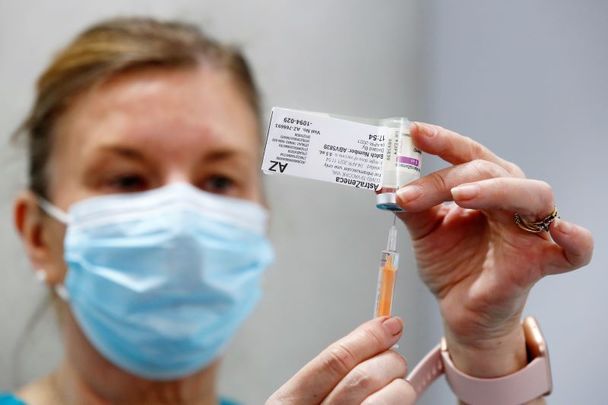Ireland's National Immunisation Advisory Committee (NIAC) has issued revised advice to the Department of Health on the use of the AstraZeneca COVID-19 vaccine in light of the outcome of the recent investigation by the European Medicines Agency (EMA).
In a statement on April 12, the NIAC said: "The EMA has added unusual clotting events with low platelet counts as very rare side effects to the vaccine product information. These rare events are estimated to occur between 4 and 10 in every 1 million people, one of whom may die.
"A number of EU states and other countries have issued revised advice regarding this vaccine. NIAC has consulted widely with EU colleagues, specialists in blood clotting and HIQA for input to these recommendations.
"The benefits versus the risks of this vaccine may vary by age and as alternative COVID-19 vaccines are available in Ireland, NIAC has revised the recommendations for the use of the AstraZeneca vaccine (known as Vaxzevria)."
Here are the NIAC's revised recommendations regarding the AstraZeneca vaccine:
- Any authorised COVID-19 vaccine, including Vaxzevria COVID-19 vaccine AstraZeneca, is recommended for those aged 60 years and older including those with medical conditions with very high or high risk of severe COVID-19 disease.
- Vaxzevria COVID-19 vaccine AstraZeneca is not recommended for those aged under 60 years including those with medical conditions with very high or high risk of severe COVID-19 disease.
- A second dose of Vaxzevria COVID-19 vaccine AstraZeneca should not be given to anyone who developed unusual blood clots with low platelets after the first dose.
- Advice for those who have received a first dose of Vaxzevria COVID-19 vaccine AstraZeneca is:
- Those aged 60 and older should receive their second dose 12 weeks later as scheduled.
- Those aged under 60 years with a very high risk or high-risk medical condition should receive their second dose 12 weeks later as scheduled.
- Those aged under 60 years without a very high risk or high-risk medical condition should have the scheduled interval between doses extended to 16 weeks to allow further assessment of the benefits and risks as more evidence becomes available.
Read more
Commenting on the new advice, NIAC Chair, Prof Karina Butler said: “All the authorised COVID-19 vaccines – Pfizer, Moderna and AstraZeneca and the newly approved Janssen, are highly effective in preventing hospitalisation and severe COVID-19 disease.
"Vaccination with Vaxzevria COVID-19 AstraZeneca vaccine is highly effective and substantially reduces the risk of severe COVID-19 disease across all age groups.
“NIAC realises the need to balance the significant benefits of a national vaccination programme with the very rare risk of these reported events. While this is an extremely rare condition, consideration must be given to the fact that it has a very high risk of death or severe outcome. As the risk/benefits of Vaxzevria COVID-19 AstraZeneca vaccine may vary by age and as alternative COVID-19 vaccines are available NIAC has revised the recommendations for use of this vaccine.
“In developing these recommendations, NIAC is informed by the available scientific evidence and the risk/benefits of the vaccines. New evidence will be reviewed once available and any further required recommendations will be notified to the Department of Health.
“We strongly encourage everyone to accept the COVID-19 vaccine they are offered. A high uptake of vaccine in every age group is needed if COVID-19 is to be controlled, so that public health restrictions may be safely removed” Prof Butler said.
In a statement, Ireland's Deputy Chief Medical Officer Dr. Ronan Glynn said on Monday: "As of 7 April, the Health Products Regulatory Authority (HPRA) has been notified of approximately 2,800 reports of suspected side effects associated with Vaxzevria/AstraZeneca, in the context of 204,270 doses administered.
"The HPRA confirms it has received notice of a case of special interest and is continuing to follow up on this to see if it fits the profile of the very rare blood clots which were the subject of the EMA review. An additional small number of cases describing low platelet counts have been received and follow up is ongoing to rule out the presence of blood clots.
"We will continue to monitor the roll-out of Vaxzevria/AstraZeneca in Ireland and internationally in collaboration with the HPRA and the NIAC. The Department of Health, the HSE, and the High-Level Taskforce will now work together to ensure that these updated recommendations are incorporated into the ongoing implementation of the vaccination programme."
On the foot of this announcement, Ireland's Health Service Executive (HSE) announced that all AstraZeneca vaccinations scheduled for tomorrow, April 13, will be cancelled:
If you are due to attend an Astra Zeneca clinic tomorrow you are advised not to do so. We will be in contact with patients in due course to rearrange appointments. We apologise for any inconvenience. #CovidVaccine
— HSE Ireland (@HSELive) April 12, 2021




Comments